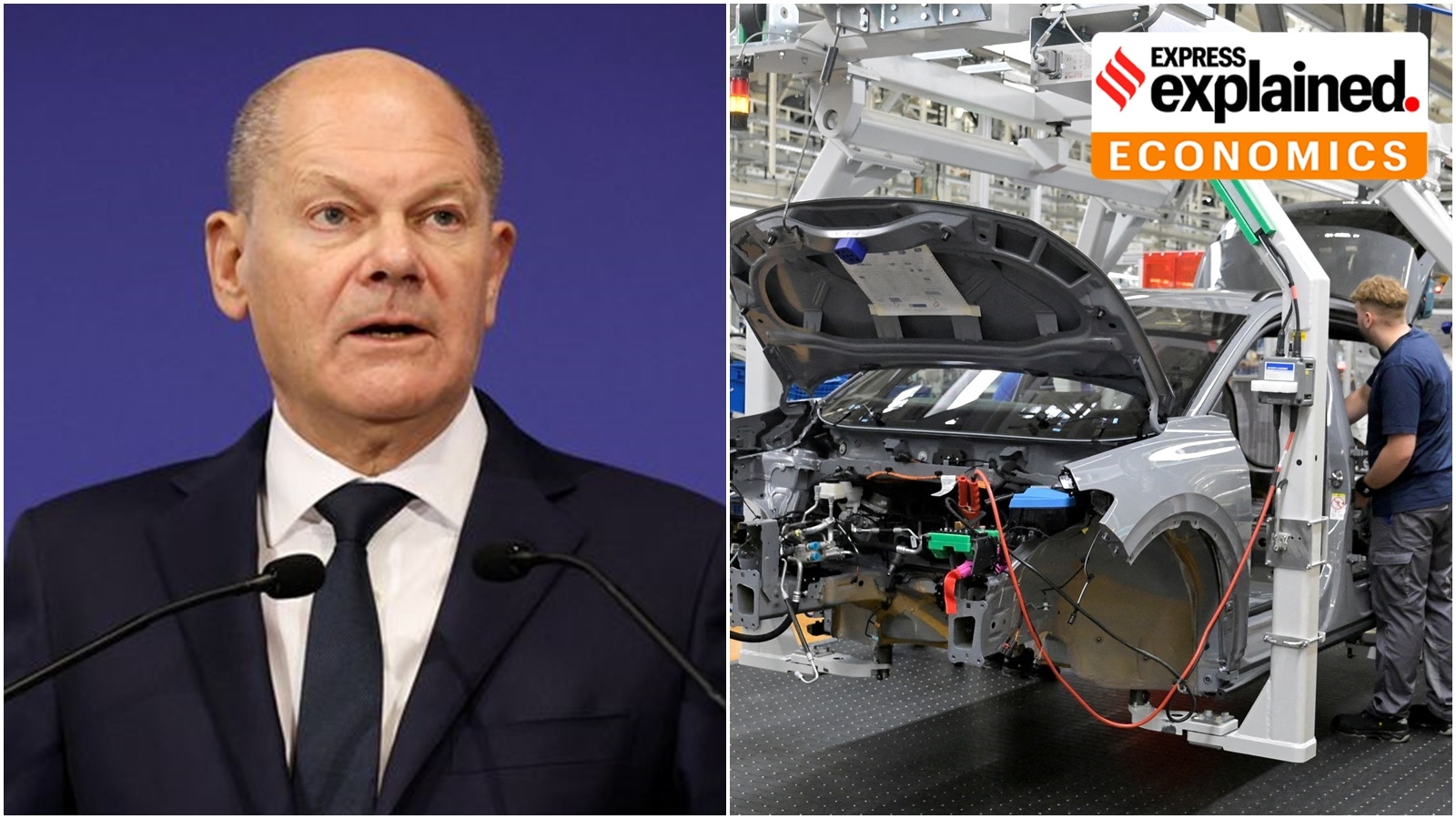Nothing better encapsulates the negativity gripping Germany than what’s happening at Volkswagen, the biggest employer in Europe’s largest economy. The spillover effect of the crisis at Volkswagen, which is looking to shut down as many as three factories in Germany — the first ever shuttering of units in its 87-year history — is showing up in the fractures in Germany’s politics now widening to a chasm.
The ‘traffic light’ coalition, Germany’s three-party formation, finally hit red earlier this week after Chancellor Olaf Scholz fired Finance Minister Christian Lindner of the pro-business Free Democrats. The underlying reason for this divorce were the government’s finances and irreconcilable differences over how to reinvigorate the German economy.

The chancellor, according to an AP report, said the minority government made up of his Social Democrats and the Greens will continue until “early next year” — even as the leader of the biggest opposition bloc in parliament, Friedrich Merz from the centre-right Christian Democrats, called for an immediate no-confidence vote and fresh elections. Scholz stressed again Thursday (November 7) that he does not want to call a vote of confidence before January 15.
The collapse of the coalition came after weeks of wrangling among the three coalition partners. The timing could not be worse: there is continued fighting in Europe and West Asia, and Germany continues to struggle to wean away from its strong business ties with both Russia and China. But the biggest change now is the reelection of Donald Trump in the United States, signalling that Europe would need to do more for its security and will have to reckon with increased tariffs. A strong German leadership would have been crucial at this point in time.
The traffic light coalition — based on the colours of the parties involved, the red Social Democrats, the yellow Free Democrats, and the Green Party — was always a fragile coalition due to the very different approaches of the three constituents. While rumblings had been on for a while, the trigger for the latest confrontation was a move by Lindner’s Free Democrats to reject tax increases or agree to tweaks to Germany’s rigid self-imposed limits on running up debt. Scholz’s Social Democrats and the Greens were, meanwhile, pushing for higher state investment and were opposed to the Free Democrats’ proposals to cut welfare programmes.
Volkswagen’s outsized impact and Germany’s industrial malaise
Volkswagen, the world’s second largest carmaker, epitomises Germany’s manufacturing prowess. The carmaker’s deepening troubles are set to have a domino effect through the entire German automotive industry, which is the country’s single-largest sector accounting for 5% of GDP and employing almost 800,000 people — over a third of whom work for Volkswagen. Plant closures at Volkswagen would mean multifold downstream sector impact.
The reason why Volkswagen is set to shut as many as three factories in Germany and lay off tens of thousands of workers involves a desperate bid to stay competitive in Europe amid sliding sales and increased competition from China, Daniela Cavallo, the company’s top employee representative, said late October.
Cavallo, who heads the council representing the company’s employees in Germany, told a gathering of workers at Volkswagen’s home plant in Wolfsburg that the proposed closures were part of a plan that managers had presented to the works council, according to an NYT report. The company “wants to close at least three VW factories, downsize all remaining plants, divest itself of core areas and, on top of that, realise heavy pay cuts for the remaining employees,” the report quoted Cavallo as saying.
Story continues below this ad
These problems go beyond Volkswagen. “We are not experiencing a crisis in the automotive industry, we are experiencing a crisis in Germany as a business location,” a spokesperson for the German Association of the Automotive Industry (VDA) said in a statement following an auto summit last month.
According to a recent study commissioned by the Federation of German Industries (BDI), a business lobby grouping, over 20% of Germany’s industrial output is at risk between now and 2030, primarily due to high energy costs and shrinking markets for German goods. “The lead that the country has built up over decades in areas such as combustion technology is losing importance, and the German export model is increasingly under pressure due to growing geopolitical tensions, global protectionism, and locational weaknesses,” the report, co-authored by the German Economic Institute (IW) and Boston Consulting Group, said.
Analysts said there are three key reasons for Germany’s relegation again to being the ‘sick man of Europe’: the country’s dependence on Russian gas, its car industry’s late embrace of electrics, and the country’s struggling digital tech push.
Economist and commentator on the Eurozone, Wolfgang Munchau, in his latest book titled Kaput, argues that the German economy’s problems have been brewing for decades. The “neo-mercantilist” policies of the German state, fostered by cross-connections between the country’s industrial and political elite, according to Munchau, have left Germany trailing in new economy sectors and extremely over-reliant on authoritarian Russia and China – and with little sign that the country is capable of adapting to the new digital realities dominated by the United States and China.
Story continues below this ad
Experts like Munchau also flag issues of overregulation and bureaucratic overreach, especially for the smaller and mid-sized firms that make up Germany’s famed Mittelstand.
According to analysis by Michał Kedzierski and Aleksandra Kozaczynska of the Warsaw-based Centre for Eastern Studies, the crisis at VW has become a central issue in German public debate and is symbolic of the poor state of the German economy. This is due to VW’s economic and symbolic importance as the global leader and the pride of the German economy, as well as to the unprecedented nature of the measures currently being considered.
“For critics of the Olaf Scholz government… these problems have provided a convenient argument to support claims of the negative consequences of the ruling coalition’s economic policies,” the study issued in September said.
Following a recession in 2023, economic activity in Germany is expected to stagnate in 2024. And while domestic demand is set to pick up slowly in 2024 and 2025, as real wage growth resumes, the problem is that investment is projected to remain well below pre-pandemic levels, constrained by continued high financing costs. Exports are forecast to remain sluggish in 2024 and slowly recover in 2025, according to the European Commission macroeconomic forecast for Germany dated May 15, 2024.
Story continues below this ad
Spillover of economic problems on to Germany politics
Till a little over 36 months ago, Germany did appear to be the epitome of economic and political success. Former Chancellor Angela Merkel was branded as the real ‘leader of the free world’, and Germany’s export-driven economic model was world-beating. But change of fortunes has been rather quick.
There is now mounting pressure on Chancellor Scholz to hold snap elections and a row has broken out between Scholz’s Social Democrats, who want a poll next March, and the opposition, Christian Democrats (CDU), which hopes to gain from a much earlier ballot.
What is ironic is the timing of the fall of the current ruling coalition: at this point in time, Scholz’s SPD is polling at third place while Free Democrats are probably not even likely to make the minimum cut-off to get into the German federal legislature, the Bundestag.
The winners are likely to be the conservative CDU, the party that had Merkel at its helm and is now led by its parliamentary leader and Chancellor hopeful, Friedrich Merz, and the far-right AFD.
Story continues below this ad
While Scholz would prefer waiting until March to win back some advantage with voters, that would mean nearly five months as a minority government, unable to pass any legislation without opposition support. In recent European politics, snap poll decisions are generally seen as ill-timed, as was the case in France earlier this year.
The German ruling coalition was always a tightrope walk, since it had three parties from different leanings and different ideas about how to revive the ailing economy. Economy Minister Robert Habeck, a Greens representative, was seen pushing for targeted government spending as a means of stimulating the economy while being tough on environmental norms, while Lindner wanted spending cuts as stimulus and to soften climate regulations.
The problem has been evident from the early days of the administration, when Germany’s Constitutional Court ruled that this government’s first budget was “unconstitutional”, with the result that the administration simply didn’t have the money that they thought they were going to have. The situation was compounded by the differences in the outlook of the three parties, which meant there were differences on how the money to bridge the deficit could be raised, especially when German companies are badly struggling.
What is worse is that with Trump back in the White house — with a stronger mandate and control over the Senate and possibly the House of Representatives than the last time around — any move by Washington to issue fresh tariff restrictions could force German companies to shift more production to the US. This could hit the German manufacturing base further. Analysts said that in due course, it could only end up improving the appeal of far-right parties such as the AFD.
Story continues below this ad
A slowdown in Germany, which could further precipitate a deepening Eurozone crisis, could be bad news for India, given the current geopolitical environment and the already uncertain external environment.







































